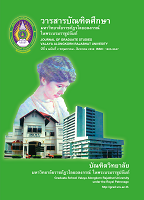ยุทธศาสตร์การเผยแผ่พระพุทธศาสนาเชิงรุก STRATEGIES FOR PROACTIVE BUDDHISM PROPAGTION
Main Article Content
Abstract
บทคัดย่อ
การวิจัยครั้งนี้มีวัตถุประสงค์ดังนี้ 1) เพื่อศึกษาการเผยแผ่พระพุทธศาสนาในอดีตและการเผยแผ่พระพุทธศาสนาในปัจจุบัน 2) เพื่อนำเสนอยุทธศาสตร์การเผยแผ่พระพุทธศาสนาเชิงรุกของพระสงฆ์ไทย การดำเนินการวิจัยเป็นรูปแบบการวิจัยเชิงคุณภาพ โดยศึกษาแนวคิด ทฤษฎีเกี่ยวกับการเผยแพร่พระพุทธศาสนา จากการค้นคว้าข้อมูลและการเก็บรวบรวมข้อมูลจากเอกสารงานวิจัยต่างๆ ที่เกี่ยวข้อง รวมทั้งวรรณกรรมของนักวิชาการทางสังคม ศาสนา และอื่นๆ ผนวกกับข้อมูลที่ได้จากการสัมภาษณ์เชิงลึกกับผู้ให้ข้อมูลสำคัญที่เป็นพระนักเผยแผ่พระพุทธศาสนา จำนวนจำนวน 31 รูปซึ่งได้มาด้วยวิธีเลือกแบบแบบ สโนว์บอล
ผลการวิจัย พบว่า การเผยแผ่พระพุทธศาสนาในอดีต มีเป้าหมายที่ชัดเจนคือ เพื่อประโยชน์สุขแก่เวไนยสัตว์ทั้งหลาย และเพื่อให้เวไนยสัตว์ทั้งหลายได้บรรลุมรรค ผลและนิพพาน สำหรับรูปแบบการเผยแผ่พระพุทธศาสนาในอดีตนั้น มีทั้งเชิงรับและเชิงรุก ส่วนวิธีการเผยแผ่ของพระพุทธองค์ทรงมีพุทธวิธีการเผยแผ่หลายแบบ ซึ่งพระองค์ทรงประยุกต์วิธีการเผยแผ่ให้เข้ากับบุคคล สังคม และสิ่งแวดล้อม ซึ่งรูปแบบและวิธีการเผยแผ่พระพุทธศาสนาในอดีตล้วนมีประสิทธิภาพและประสบผลสำเร็จทั้งสิ้น
การเผยแผ่พระพุทธศาสนาในปัจจุบัน มีเป้าหมายการเผยแผ่เพื่อมุ่งเน้นให้พุทธศาสนิกชนมีความรู้ ความเข้าใจในหลักธรรมคำสอนทางพระพุทธศาสนาอย่างถูกต้อง และสามารถนำไปปฏิบัติเพื่อให้เกิดประโยชน์ต่อตนเองและผู้อื่น สำหรับรูปแบบการเผยแผ่นั้นในปัจจุบันเป็นแบบเชิงรุกมากกว่าเชิงรับ ส่วนวิธีการเผยแผ่นั้นขึ้นอยู่กับความสามารถและเชี่ยวชาญของผู้เผยแผ่ ซึ่งมีวิธีการเทศนาธรรมปาฐกถาธรรม อภิปรายธรรม สนทนาธรรม การสอนกรรมฐาน และการสอนแบบประยุกต์
ยุทธศาสตร์การเผยแผ่พระพุทธศาสนาเชิงรุกของพระสงฆ์ไทย มีเป้าหมาย 3 ด้าน คือ (1) ด้านการศึกษา เป็นการศึกษาเรื่องไตรสิกขา (2) ด้านศาสนาคือ การเรียนรู้ และเข้าใจศาสนพิธีต่างๆ ทางพระพุทธศาสนา และ(3) ด้านวัฒนธรรม คือ การตระหนักถึงคุณค่าทางประเพณีและวัฒนธรรมทางพระพุทธศาสนา สำหรับรูปแบบและวิธีการเผยแผ่พระศาสนานั้นต้องเป็นแบบเชิงรุกโดยผู้เผยแผ่พระศาสนา แต่ละท่านต้องประยุกต์ความถนัดของตนให้เกิดผลสำเร็จตามเป้าหมายที่วางไว้ ตามยุทธศาสตร์การเผยแผ่พระพุทธศาสนาเชิงรุกที่นำเสนอประกอบด้วยยุทธศาสตร์ 4 ด้าน คือ 1) ยุทธศาสตร์การสร้างเครือข่าย โดยใช้ความร่วมมือจากทุกองค์กรที่เกี่ยวข้อง 2) ยุทธศาสตร์การขยายพลัง โดยสนธิความสามารถของกลุ่มศาสนิกชนต่างๆ ให้เกิดพลัง 3) ยุทธศาสตร์การปลูกฝังศรัทธา กระทำโดยพัฒนาแบบการปฏิบัติในการเข้าถึงหลักธรรมอย่างถูกต้อง 4) ยุทธศาสตร์การแสวงหาความหลุดพ้นกระทำโดยมุ่งเน้นปฏิบัติต่อกลุ่มพุทธศาสนิกชนที่เหมาะสม เพื่อการหลุดพ้นทุกข์อย่างแท้จริง ซึ่งเป็นยุทธศาสตร์ที่สำคัญที่สามารถใช้เป็นแนวทางในการปฏิบัติของคณะสงฆ์ เพื่อการเผยแผ่พระพุทธศาสนาเชิงรุกต่อไป
ABSTRACT
The objectives of this research were 1) to study the propagation of Buddhism in the past and in the current operation and 2) to propose the strategies for proactive propagation of Buddhism by the monks in Thailand. The research method was qualitative research which was conducted by studying the concept and theories on propagation Buddhism the data were collected from research and related documents including literatures of sociology, religion and others, combining with in-depth interviewing with 31 key informants selected from the preacher monks by snowball sampling.
The research findings were as follows:
1. There were clear objectives of the propagation of Buddhism in the past. The goal was to make all people happy in order to achieve results and to attain the means to Nivana. The propagations of Buddhism in the past were both passive and active. Buddha, had various forms of propagation; He tried to develop his own methods of propagation by applying his own experiences with societies and environments. It could be concluded that all forms and methods of Buddhist propagations of Buddhism in the past were very effective and successful.
The current propagation of Buddhism had specific goals focussed on the teaching of Buddhist followers for having correct knowledge and understanding in Buddhist principles and would be able to implement for their own benefits and for others. The current form of propagation was more proactive rather than passive operation. There methods of propagation depended on the skill and expertise of the missionaries including Dhamma Sermon, Dhamma Lecture, Dhamma Discussion, Dhamma Discourse, Meditation Teaching and applied teaching.
2. The strategies for proactive propagation of the monks in Thailand comprised of 3 objectives as follows (1) the aspect of education; the education should focus on Tilakkhana (the three signs of being), (2) the aspect of religion; the followers should be informed and understand about the Buddhist religions ceremony and (3) The aspect of culture; the followers should be enhanced to uphold in the value of Buddhist traditions and Buddhist cultures. The propagation model and method of propagation should be proactive by applying their own skills to accomplish the desired objectives. The proposed proactive strategy consisted of 4 principle aspects including (1) networking strategy: it should be conducted by promoting the close cooperation from all organizations concerned, (2) power expansion strategy: it should be accomplished by integrating the capabilities of all religious groups, (3) faith enhancing strategy: it could be achieved by presenting the correct way of Dhamma studying and (4) Cessation of Suffering strategy: it should be focused on the group of Buddhist followers who needed to seek the paths leading to cessation of Suffering.
Article Details

This work is licensed under a Creative Commons Attribution-NonCommercial-NoDerivatives 4.0 International License.
บทความทุกเรื่องได้รับการตรวจความถูกต้องทางวิชาการโดยผู้ทรงคุณวุฒิ ทรรศนะและข้อคิดเห็นในบทความ Journal of Global of Perspectives in Humanities and Social Sciences (J-GPHSS) มิใช่เป็นทรรศนะและความคิดของผู้จัดทำจึงมิใช่ความรับผิดชอบของบัณฑิตวิทยาลัย มหาวิทยาลัยราชภัฏวไลยอลงกรณ์ ในพระบรมราชูปถัมภ์ กองบรรณาธิการไม่สงวนสิทธิ์การคัดลอก แต่ให้อ้างอิงแหล่งที่มา


